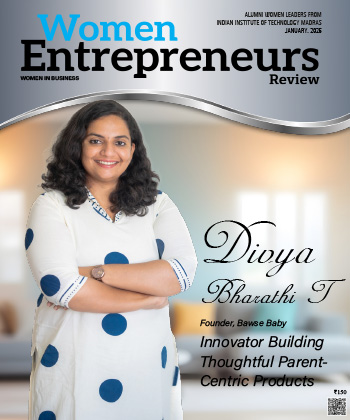
The Strategic Role of HR in Shaping the Future of the Consumer Goods Industry
By: Shaili Tyagi, Chief Human Resources Officer, Sheela Foam
Shaili Tyagi is a dynamic HR leader with global and cross-industry experience spanning telecom, agri, and manufacturing sectors. She is known for shaping impactful talent strategies, driving organizational effectiveness, and guiding ethical execution through close collaboration with business leaders.
In an impactful interaction with Women Entrepreneurs Review Magazine, Shaili shares her perspectives on the evolving role of HR in meeting rapid talent demands, integrating ESG into people practices, and ensuring agile yet human-centered strategies in the dynamic consumer goods sector.
In the current landscape of India’s consumer goods market, how do you see HR's role evolving in responding to the fast-paced demands for talent in industries like mattress and foam products?
India’s rapidly transforming consumer goods landscape—particularly in sectors like mattresses and foam products—demands a bold reinvention of the HR function. HR’s role is becoming increasingly strategic and dynamic; HR is now expected to act as a strategic business partner, deeply embedded in anticipating and fulfilling workforce needs. With market conditions changing swiftly, agile talent acquisition and workforce planning have become critical levers for success. Today’s HR leaders must proactively identify skill gaps and drive faster, smarter onboarding to ensure business readiness. At the same time, fostering a culture of continuous learning and upskilling is vital to keep pace with innovation and evolving consumer expectations. In this competitive talent market, building a compelling employer brand and embracing technology for data-driven decisions are no longer optional—they are strategic imperatives.
Considering the rise of sustainability concerns, how is your organization integrating ESG practices into talent development and employee engagement within the competitive consumer goods sector?
In response to growing sustainability concerns, our organization is actively integrating ESG practices into talent development and employee engagement to stay ahead in the competitive consumer goods sector. We prioritize health and well-being through structured wellness programs and provide proactive emotional wellness support tailored for both leadership and middle management. Our commitment to gender equality is reflected in inclusive hiring and development policies. Our focus on professional skill development includes ESG-focused learning modules and upskilling programs that empower employees to contribute meaningfully to sustainable business goals. On the production front, we conduct regular engagement initiatives and safety training, embedding ESG principles into daily operations. For our production workforce, we focus on meaningful employee engagement initiatives that foster inclusivity, recognition, and a sense of purpose. These efforts not only support our ESG goals but also drive a more engaged, empowered, and sustainable workforce in the highly competitive consumer goods sector.
How do you ensure that HR strategies are agile enough to keep up with technological advancements while retaining a human-centered approach?
To stay ahead in the fast-paced digital transformation of the consumer goods industry, we ensure our HR strategies remain agile while firmly retaining a human-centered approach. Our i-Connect digital platform empowers employees to raise queries, concerns, and doubts with ease, promoting transparency and accessibility. We have embraced digital compliance for key policies like POSH and Code of Conduct, ensuring timely awareness and adherence. The performance management process is now fully digitized, enabling continuous feedback and real-time goal tracking. We leverage advanced talent acquisition aggregators and tools to enhance hiring precision and speed. Simultaneously, automation of HR processes reduces administrative load, allowing us to focus on meaningful, personalized employee experiences that foster engagement and trust.
In light of the current market dynamics, what are the most challenging talent gaps you face, and how are you approaching their resolution without compromising on company culture or values?
In the consumer industry’s current landscape, the most challenging talent gaps we face are bridging talent gaps in digital readiness, innovation capability, and leadership agility. As the consumer goods sector evolves, there is a growing need for professionals who can seamlessly integrate technology with consumer insight and drive change. To address this, we are investing heavily in upskilling and reskilling programs, cultivating internal talent pipelines while leveraging strategic hiring for niche skills. At every step, we remain deeply committed to preserving our company culture and values, ensuring that new talent aligns with our ethos of collaboration, integrity, and performance. This balanced approach helps us stay competitive without compromising who we are at the core.
As an influential HR leader, how do you balance the need for innovation in employee development programs with the growing pressure for cost-effectiveness in the consumer goods industry?
As an HR leader, I strike a balance between innovation in employee development and cost-effectiveness by anchoring every initiative to tangible business outcomes. Instead of chasing trends, we design programs that address core capability gaps and measure their success through clear metrics like productivity improvements, quality benchmarks, and internal mobility rates. Our approach focuses on high-impact learning interventions that directly contribute to performance, agility, and leadership readiness. By aligning development efforts with strategic business goals, we ensure optimal return on investment while nurturing a future-ready workforce. This disciplined yet forward-looking mindset allows us to innovate meaningfully, without straying from our commitment to efficiency and impact.
How do you foster a culture of ethical execution while managing the pressures of talent retention and the increasingly competitive landscape in India's leading mattress and foam products industry?
Fostering ethical execution in the mattress and foam industry while addressing talent retention and competition requires a values-driven approach. A strong commitment to transparency, sustainability, and fair business practices reinforces trust among employees and stakeholders. In the fast-moving mattress and foam products sector, we ensure that our leaders model integrity and accountability, reinforcing these behaviors through consistent communication and recognition. Our Code of Conduct and compliance frameworks are not just policy documents but are brought to life through regular conversations and training.
To navigate talent challenges at Sheela Foam, we prioritize employee well-being, skill development, and career growth while maintaining ethical standards. An inclusive and collaborative work culture at SFL ensures employees remain engaged despite industry pressures. By embedding integrity, innovation, and employee empowerment into daily operations, we aim to achieve long-term success while sustaining a competitive edge in a fast-evolving market.
Most Viewed
- 1 Women's Health Startup HerMD Closing Doors Amid Industry Challenges
- 2 5 Famous Women in Indian Armed Forces
- 3 Saudi Women No longer Require Male Permission for Clothing Choices, says Prince MbS
- 4 Kolkata Medtech Startup Innovodigm Raises Rs 5.5 Crore Seed Funding Led by IAN Group
- 5 Yamunanagar's Kashish Kalra Honoured after Securing 111th Rank in UPSC Civil Services Exam
- 6 Madurai Appoints Its First Woman Corporation Head
- 7 IAS Vijayalakshmi Bidari Appointed as the new Nagpur Divisional Commissioner
- 8 American Entrepreneur Lucy Guo Overtakes T Swift to become Youngest Female Billionaire
- 9 ICC Women's World Cup 2025 Trophy Showcased at Indore's Holkar Stadium
- 10 Aparna Saxena's Beauty Venture AntiNorm Launches in India
- 11 Vidya Nataraj Co-Founded BlueStone Jewellery & Lifestyle files IPO
- 12 5 Women Freedom Fighters of India
- 13 Dr. G Krishnapriya appointed as CEO for Trichy
- 14 M3M & Sirona Partner to Introduce Menstrual Hygiene Vending Machines in 15 Locations
- 15 Punjab Govt launches SHE Cohort 3.0 Supporting Tech-led Women Startups
- 16 Indian origin Lawyer, Sweena Pannu appointed as the US New Superior Court Judge
- 17 The Aurora Tech Award recognizes 4 Indian Women-led Startups
- 18 Kerala's Republic Day parade featured an all-female tableau
- 19 Manisha Kabbur Becomes Karnataka's First Woman International Karate Coach
- 20 Director K. S. Ravikumar's Daughter Maalica Ravikumar Launches Life Coaching Company 'Evergrowth Academy' for Women
- 21 Leezu's Raises Pre-Seed Funding to Accelerate Growth in Sexual Wellness Industry
- 22 Sattu: Super-easy summer drink for PCOS gut healing
- 23 Swathi Nelabhatla creates Sitha App, India's First Women-Exclusive Gig Platform
- 24 7 Timeless Female Kathak Dancers & their Iconic Legacies
- 25 Meet 7 Iconic Women Architects of Modern India & their Most Impactful Work
- 26 This Woman-led Insuretech Startup is Helping Bridge the Education Financing Gap in India
- 27 Women Leaders Share Lessons Learnt from India Women's WC Win
- 28 5 Enterprising Women Founders Powering Singapore's Tech & Innovation Landscape
- 29 4 Women. 4 Stories. One Vision for Smarter, Stronger Healthcare
- 30 Global Gender Gap Narrows to 68.8%, But Full Equality 123 Years Away: WEF Report 2025
- 31 Changemakers: 7 Women Entrepreneurs Taking the Make in India Movement Forward
- 32 Meet Lucy Guo, The Youngest Self-Made Female Billionaire Disrupting Tech
- 33 How Women are Driving India's Festive Online Shopping Surge






